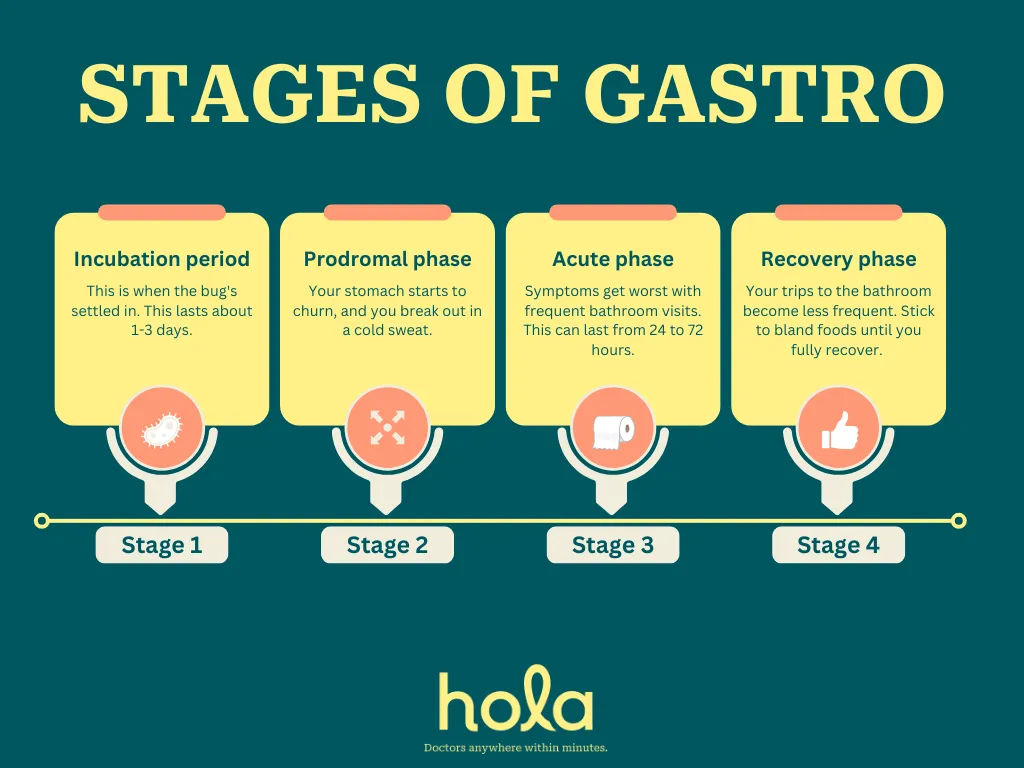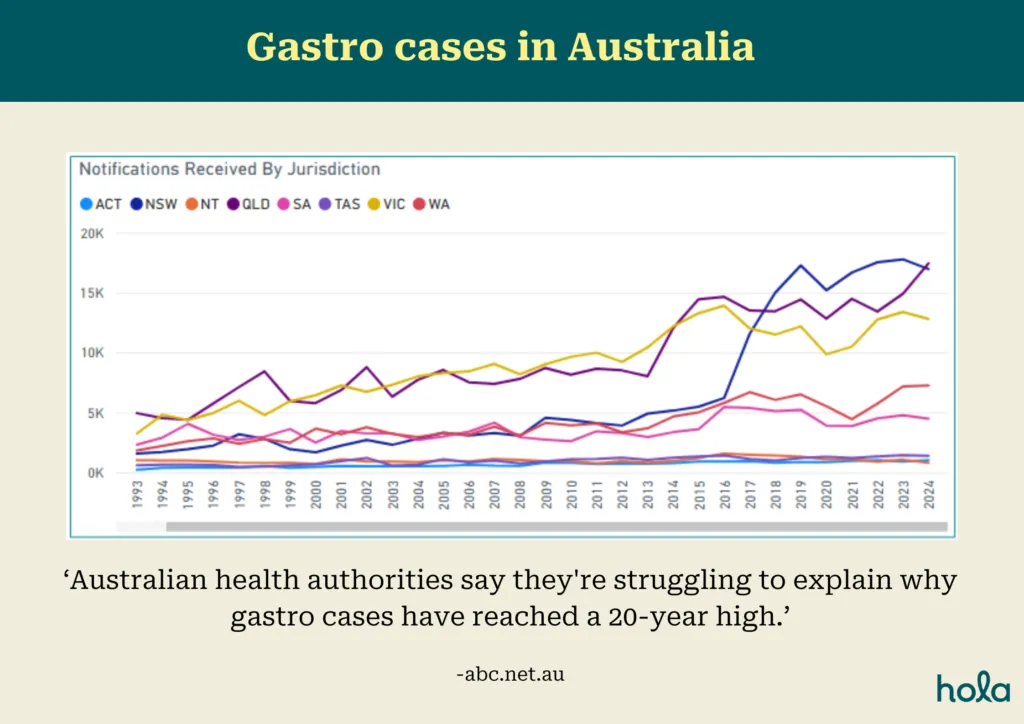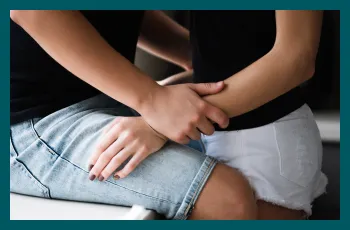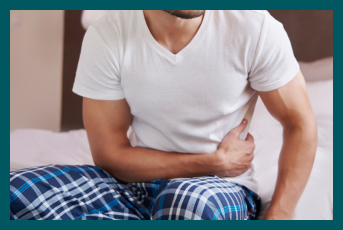Stages of Gastroenteritis in Adults
Written by Dr Nelson Lau, MBBS FRACGP, GP & Digital Health Specialist. Originally published on 24 June 2024.Blog updated on 18 September,2025.

Contents

Overview
In Australia, gastro outbreaks are common and can spread quickly through places like nursing homes, offices, and even on holiday cruises. We'll break down how to tell the difference between gastro and food poisoning, how long you can expect the symptoms to last, the important signs that you need a doctor for a prescription or a GP medical certificate to rest at home, and the best ways to take care of yourself at home.What is gastroenteritis?
Simply put, gastroenteritis is when your stomach and intestines get inflamed. Usually, it's thanks to a virus or bacteria that has entered your digestive system. Sometimes parasites or even food toxins can be the culprits. Whatever the cause, the result is the same: a combination of diarrhoea, vomiting, cramping, and possibly fever.Causes gastroenteritis in adults?
Gastroenteritis can be caused by various factors, including:- Viruses: Norovirus and rotavirus are the most common viral causes.
- Bacteria: Salmonella, E. coli, and Campylobacter can lead to bacterial gastroenteritis, often through contaminated food or water.
- Parasites: Giardia and Cryptosporidium are less common but can cause prolonged symptoms.
- Toxins and chemicals: Consuming contaminated or spoiled food can lead to irritation and inflammation of the digestive tract.
Symptoms in adults
Gastroenteritis symptoms vary depending on the cause, but typically include:- Watery diarrhoea
- Nausea and vomiting
- Abdominal cramps and pain
- Fever and chills
- Fatigue and weakness
- Loss of appetite
- Headache and body aches
Note: Common symptoms include diarrhoea, vomiting, and abdominal pain, with the illness lasting anywhere from a few days to a week.
Stages of gastro

How is stomach flu treated in each stage?
Gastroenteritis can be tough to endure but understanding how to manage each stage effectively can help speed up recovery and prevent complications. Let's break down the treatment approach for each phase:Stage 1: - Incubation period (1-3 days)
At this point, the virus or bacteria have entered your system, but you don't have symptoms yet. Even though you're feeling fine, if you suspect exposure (e.g., a family member is sick or you ate questionable food), you can take early precautions:- Stay hydrated: Start increasing your fluid intake to support your immune system.
- Practice good hygiene: Wash your hands frequently to prevent spreading or catching the infection.
- Eat lightly: Avoid heavy or greasy foods that could stress your digestive system in case symptoms develop.
Stage 2: - Prodromal phase (Early warning signs)
Once nausea, mild cramps, or a queasy feeling set in, your body is warning you that gastroenteritis is taking hold. While full symptoms haven't hit yet, you can prepare by:- Hydration first: Start sipping on clear fluids (water, herbal teas, broths, electrolyte drinks) to stay ahead of dehydration. Avoid caffeine and alcohol.
- Rest up: Fatigue may begin setting in, so listen to your body and rest as much as possible.
- Take it easy on food: If you're still able to eat, stick to light meals like crackers, bananas, or plain toast to avoid triggering nausea.
- Ginger or peppermint: These natural remedies may help soothe nausea before it worsens.
Stage 3:- Acute phase (24-72 hours of full-blown symptoms)
This is the worst stage—vomiting, diarrhoea, stomach pain, fever, and exhaustion. At this point, your focus should be on symptom relief and preventing dehydration:- Replace lost fluids: Drink small sips of oral rehydration solutions (ORS), coconut water, or clear broths to replace lost electrolytes. Avoid sugary drinks like soda.
- Anti-nausea remedies: Ginger tea or sucking on ice chips may help ease nausea. In severe cases, an online doctor may prescribe anti-nausea medication (e.g., ondansetron) via telehealth.
- BRAT diet: Once you're able to eat, bananas, rice, applesauce, and toast are gentle on the stomach.
- Medication for fever/pain: Medicine can help manage fever and body aches, but avoid ibuprofen if you're dehydrated, as it may irritate the stomach.
- Rest and isolate: Your body needs energy to fight the infection, so rest as much as possible and avoid spreading germs to others.
Stage 4:- Recovery phase (gradual improvement)
You're finally on the mend, but your digestive system is still sensitive. During this stage:- Continue hydrating: Your body is still replenishing fluids lost during the acute phase. Keep drinking water, electrolyte solutions, or herbal teas.
- Gradually reintroduce foods: Start with bland, easy-to-digest foods like toast, rice, boiled potatoes, plain chicken, and some yoghurt. Avoid dairy, spicy, or greasy foods until fully recovered.
- Probiotics for gut healing: Taking probiotic-rich foods (yoghurt, kefir) or supplements can help restore gut bacteria balance after gastroenteritis.
- Ease back into normal activities: Fatigue is common, so don't rush back into strenuous activities; let your body recover fully.
Note: Treatment varies by stage, but hydration, rest, and a gentle diet are key to managing symptoms.
Experiencing these symptoms? Speak with a doctor within 15 minutes.
Gastro vs Food Poisoning
These terms are often used interchangeably, but they're not the same thing, and there's actually a technical difference that's worth understanding:- A viral infection most often causes gastroenteritis (or gastroenteritis), and norovirus and rotavirus are the usual suspects. It's incredibly contagious and can spread easily from person to person simply through contact with unwashed hands, contaminated surfaces, or sometimes through food. The key characteristic of gastro is its ability to spread very quickly through communities.
- Food poisoning, on the other hand, is specifically caused by eating food that's contaminated with bacteria (such as Salmonella or E. coli) or their toxins. Think of undercooked chicken, spoiled mayo, or dodgy seafood - these are common culprits. The big clue is if everyone who ate the same meal gets sick around the same time.

Home care & self-management
Looking after yourself at home is the key to recovery. Here's what to do:- Focus on Fluids: Sip small amounts of water, an oral rehydration solution (like Hydralyte or Gastrolyte from the chemist), or diluted juice regularly. Make sure not to gulp down large amounts, as it can make your nausea worse.
- Rest Up: Your body needs all its energy to fight the virus, so it's important to take time off from work and permit yourself to rest.
- Ease Back into Food: When your appetite returns, start with bland, easy-to-digest foods like plain toast, crackers, boiled rice, porridge, bananas, or soup.
- Avoid Irritants: Alcohol, caffeine, sugary drinks, and fatty or spicy foods should all be avoided as they can irritate your stomach and worsen dehydration.
- Stay Home: You should remain at home for at least 48 hours after your last episode of vomiting or diarrhoea to avoid passing it on.
- Be Hygienic: Wash your hands thoroughly with soap and water and disinfect any surfaces you touch to prevent spreading the virus to others in your household. Don't share cups and food utensils with others while you're sick.
When to consult a doctor?
Most of the time, gastroenteritis is like a bad houseguest - unpleasant, but it'll leave eventually. However, sometimes you need a telehealth appointment to consult the doctor. Here are the signs you should look out for:- If you're very dehydrated (signs include severe thirst, dry mouth, minimal passing of urine, and feeling dizzy)
- If your symptoms are still severe after a week
- If you're running a fever over 39°C
- If you see blood in your stool
How Hola Health can help you
Dealing with gastroenteritis can be uncomfortable and sometimes worrying, especially when symptoms like vomiting, diarrhoea, or dehydration start to affect your daily life. Hola Health makes it easier to access trusted medical information and guidance when you need it most. Our online doctors can assess your symptoms online, provide personalised advice, and recommend the proper treatment or rehydration plan to support your recovery, including after hour doctor consultation. If your condition requires further medical attention, they can also guide you on when to seek in-person care.
In addition, Hola Health offers secure online telehealth consultations and prescriptions, allowing you to manage mild gastrointestinal symptoms from the comfort of your own home without unnecessary travel. Whether you need expert reassurance during the day or support from an after-hours doctor when things get overwhelming at night, Hola Health ensures you receive professional support every step of the way — helping you feel better, faster.
FAQs
How long does gastro last in adults in Australia?
Typically, the intense symptoms of viral gastroenteritis last for 1-3 days. Bacterial infections may hang on for up to a week. It's normal to feel tired and run-down for a few days even after you start feeling better.What are the first signs of gastroenteritis?
It often begins with a sudden loss of appetite, nausea, and rumbling stomach cramps. This is usually quickly followed by diarrhoea or vomiting, and sometimes a fever.Can you have gastro without diarrhoea?
Yes, it's possible. Some people experience a version of gastrodominated by vomiting, nausea, and cramps with very little diarrhoea. However, the symptoms can vary from person to person.How do I know if it's food poisoning or gastro?
It can definitely be tricky sometimes. If several people who ate the same food all get sick within a few hours of each other, it's much more likely to be food poisoning. If people in your home, office, or school get sick one after another over several days, it's more likely to be contagious gastro.Can I get a medical certificate online for gastro in Australia?
Yes, you can. Many Australian telehealth services can provide a medical certificate from a registered doctor after a consultation if they deem it to be appropriate. This is a valid reason to take time off work or study while you're contagious.Is gastro contagious, and how long should I stay home?
Gastro is extremely contagious. You should isolate yourself at home for at least 48 hours after your last symptom (vomiting or diarrhoea) has completely passed. This is also the best way to break the cycle of infection.Can gastro cause complications like IBS or lactose intolerance?
Unfortunately, yes. A particularly severe bout of gastro can sometimes trigger temporary lactose intolerance or a condition known as post-infectious IBS (Irritable Bowel Syndrome), where gut symptoms persist. These often settle down over time, but it's a good idea to see your GP if problems continue.How do I rehydrate quickly during gastro?
The fastest and most effective way is to use an oral rehydration solution (ORS) from your pharmacy, such as Hydralyte or Gastrolyte. These are specially formulated to replace the fluids and essential salts you've lost. If you don't have any on hand, sipping water, weak tea, or diluted juice is better than nothing.Can home remedies alleviate gastroenteritis in adults?
While medical treatment may be necessary in severe cases, these home remedies can help ease symptoms:- Hydration: Drink plenty of fluids, including herbal teas and broths.
- BRAT Diet: Eat bananas, rice, applesauce, and toast to ease digestion.
- Ginger and Peppermint: These natural remedies can help with nausea and stomach discomfort.
- Rest: Give your body time to recover.
- Probiotics: Yoghurt and probiotic supplements can aid digestion.
What are the possible complications of gastroenteritis in adults?
While most cases resolve on their own, complications can arise, including:- Severe dehydration: Can lead to dizziness, low blood pressure, and kidney issues.
- Electrolyte imbalance: Loss of essential minerals may affect heart and muscle function.
- Secondary infections: Bacterial gastroenteritis can sometimes lead to prolonged gut infections.
- Irritable Bowel Syndrome (IBS): Some individuals experience long-term digestive changes.
What can be mistaken for gastroenteritis in adults?
Some conditions have symptoms similar to gastroenteritis, such as:- Food poisoning: Rapid onset of symptoms after consuming contaminated food.
- Irritable Bowel Syndrome (IBS): Chronic digestive discomfort without infection.
- Appendicitis: Sudden, sharp pain in the lower right abdomen.
- Inflammatory Bowel Disease (IBD): Includes Crohn's disease and ulcerative colitis.
- Lactose intolerance: Digestive upset triggered by dairy products.
What foods should I eat or avoid while having gastroenteritis?
Best foods to eat:- Bananas, rice, applesauce, and toast (BRAT diet)
- Plain crackers and boiled potatoes
- Clear broths and herbal teas
- Spicy, fried, or fatty foods
- Dairy products (if they worsen symptoms)
- Caffeinated and alcoholic beverages
- Sugary or carbonated drinks
15 minutes, anytime, anywhere.
What we treat
- Cough
- Nausea & vomiting
- Fever
- Hayfever
- Fatigue
- Sore throat
- Acne
- Hair loss
- Gout
- Eczema
- Rosacea
- Sunburn
- UTI
- Erectile dysfunction
- Contraception
- Morning sickness
- Morning after pill
- Prostate health
- Anxiety
- Depression
- Stress
- Grief & loss
- Antidepressants
- Premature ejaculation
- Asthma
- Blood pressure
- Blood thinners
- Diabetes
- Cholesterol
- Migraines & headaches
- Allergies
- Body ache
- Heartburn & reflux
- Sleep disorder
- Pain relief
- Gastro
Related Articles
Disclaimer
This blog is for general informational purposes only and does not indicate that Hola Health provides all treatments or preventive measures mentioned. It is not intended to be a substitute for professional medical advice. Always seek the guidance of your doctor or other qualified health professional with any questions you may have regarding your health or a medical condition. For emergencies please immediately contact 000. Any medical topics discussed are intended to educate, not to imply availability through Hola Health.
 Facebook
Facebook  X
X  Copy Link
Copy Link



